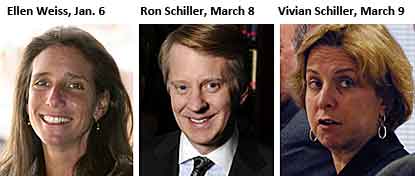DISARRAY: Takedown leaves gaps in network's top ranks
NPR is facing the most serious political crisis in its history with no chief executive to speak for it, no chief fundraiser to make sure its new building can be finished, and no chief journalist to rebuff or heed criticism of its newsroom.
“People feel that they’ve been let down, and there’s this vacuum at NPR, and what’s next?” said Dave Edwards, chair of the NPR Board. “Those emotions are felt by people in NPR’s building, at stations and by board members. The board has an obligation to stabilize things. That’s what we’re working on.”
 Joyce Slocum, general counsel and senior v.p. of legal affairs, was named interim c.e.o. after the departure of Vivian Schiller March 9, but she has asked the NPR Board to recruit another exec to serve as the public face of NPR, speaking for it in Congress and to the press, she told Current.
Joyce Slocum, general counsel and senior v.p. of legal affairs, was named interim c.e.o. after the departure of Vivian Schiller March 9, but she has asked the NPR Board to recruit another exec to serve as the public face of NPR, speaking for it in Congress and to the press, she told Current.
“There is a lot going on and that is not my strength,” Slocum said. “I’ve asked the board to consider identifying someone to come in and fill that role, and they are seriously evaluating that.”
“We have every confidence in Joyce as the c.e.o., but she can’t do everything,” said Edwards. The board’s executive transition committee is working to identify candidates, and Edwards hopes it will announce another interim appointment this week.
Defending NPR now could be classed as front-line duty, with the ongoing danger of encountering the political equivalent of an improvised explosive device.
Ellen Weiss, NPR's news v.p., lost her job Jan. 6, as a result of the handling of Juan Williams' firing and the ensuing media fireball.
Ron Schiller, NPR’s v.p. of development and president of its foundation, took the hit March 8, when right-wing provocateur James O’Keefe and his Project Veritas released a covertly recorded video of Schiller (separate story) making dismissive remarks about conservative Republicans, Tea Party members and evangelical Christians. And his boss, NPR President Vivian Schiller, resigned the next day.
Anger over Ron Schiller's remarks, the video entrapment and the subsequent damage to NPR’s reputation and possibly its funding has roiled NPR’s staff and all of public radio.
Journalists at the network in particular feel burned that a video of a fundraiser’s casual, private comments is being used as proof that their reporting is biased.
Schiller’s “offensive” comments “violated the basic principles by which we live and work: accuracy and open-mindedness, fairness and respect,” said a brief communiqué to listeners and supporters. It was signed by 22 NPR program hosts and correspondents and posted March 10 on websites including Jim Romenesko’s journalism blog.
“Those comments have done real damage to NPR,” the statement said. “But we’re confident that the culture of professionalism we have built, and the journalistic values we have upheld for the past four decades, will prevail. We are determined to continue bringing you the daily journalism that you’ve come to expect and rely upon: fair, fact-based, in-depth reporting from at home and around the world.
“With your support we have no doubt NPR will come out of this difficult period stronger than ever.”
“This is our most significant threat ever to public radio and public television,” said Mark Vogelzang, manager of WBFO in Buffalo and a former NPR Board member who was NPR’s interim development chief before Ron Schiller signed on.
“I have great confidence in the fact that our listeners and supporters will step up if federal funding is curtailed,” Vogelzang said, but he predicted that all of public broadcasting would be harmed if CPB funding is cut.
The House has approved defunding of CPB for 2013; that issue and many bigger appropriations will be decided in a conference committee between House and Senate leaders.
Vogelzang is especially worried about wrapping up the $25 million capital campaign for NPR’s new headquarters in Washington, D.C., already under construction and scheduled for completion next year. “This is a real damaging blow to our ability to raise money for the building and advance the cause for significant support for the institution of public radio at a time when we need it most,” he said.
Charlie Kravitz, new g.m. of WBUR-FM in Boston, hears a growing consensus among station execs that public radio has so far failed to mount a sufficient defense against its critics. “[T]his is not serving public radio or NPR well — to not have a powerful and coherent and consistent voice of advocacy in defense of the great work that’s been done here.”
Kravitz, who started his job Jan. 1, visited NPR last week to introduce himself and said conversations suggested a bolder strategy may be forming. “I believe that there will be a more concerted effort in the future.”
In a letter to listeners of KALW-FM in San Francisco, General Manager Matt Martin urged them to join the 170 Million Americans campaign supporting federal aid. “I am deeply concerned about Vivian Schiller’s resignation, and the message it sends to those who aren’t just critical of NPR and public broadcasting, but who want dismantle them all together,” Martin wrote. “Right now, the opponents of public media are playing hardball. This is a victory for them, and we can be sure they aren’t finished.”
But in Fairfield, Conn., WSHU Public Radio has abstained from advocacy to stay faithful to its journalistic role, said News Director Naomi Starobin.
During a recent pledge drive, fundraisers steered clear of discussing public broadcasting’s troubles, even as its news broadcasts reported on developments at NPR. Yet Starobin sees that the attack on NPR has stirred fans to support pubradio. She said one Connecticut donor raised his contribution from $500 to $10,000 in recognition of the threat to federal funding.
System leaders are split over defensive strategy, however.
Under Vivian Schiller, NPR recognized the especially difficult position of a news organization defending itself amid political controversy while lobbying Congress for public radio’s funding and sending its reporters to cover news on Capitol Hill. In February NPR temporarily put its lobbying function under the command of public TV’s, consolidating as the Public Media Association.
But for years NPR has handled the lobbying for its member stations as well as its many other tasks. That helps maintain stable support for the lobbying function, because pubradio doesn’t have a separate little lobbying unit, such as pubTV’s Association of Public Television Stations, that can suffer member defections when individual stations choose to stop paying dues.
Doubts about NPR Board
Schiller is the second NPR chief exec in a row to leave in a hurry.
The board gave Ken Stern a trial run as c.e.o. in September 2006 without opening a full executive search and grew tired of his management style within 18 months.
It hired Vivian Schiller in December 2008, and she led NPR through the recession while extending the network’s service via digital platforms. Then system leaders winced or scowled as she announced that broadcast antennas would soon be useless. Last fall, the board docked her compensation after the mishandling of the Juan Williams firing, and on March 9 accepted her resignation. That was the day after the sting video put Ron Schiller’s remarks on the Web.
But it’s not easy to find an executive who can straddle the gap between two visions of NPR. One is that NPR will remain the loyal child of the stations that have nurtured it and not stray too far from its roots in broadcast radio. The other, adopted by Schiller, is that NPR must take the lead in developing online and mobile media while helping stations come along, if they can.
“The fundamental problem here is that you have a board that exists to protect and serve the interests of a member organization,” said a veteran NPR reporter who had not been authorized to give an interview and asked not to be identified. “The board is dominated by member stations, and we’re an international news organization....That’s a complete disconnect.” The reporter said the member stations have “parochial interests” that conflict with NPR’s.
Edwards, who manages Milwaukee Public Radio, addressed such criticisms in a March 16 meeting with NPR staff. “I tried to explain the fact that this is not the time to be discussing governance,” Edwards said. “We’ve got plenty on our plate right now. This issue has been around for a long time. I just don’t see anything changing in the short term.”
Debates about the makeup of the NPR Board have come up repeatedly for decades, he told Current, and proposals to alter the balance of station managers and lay representatives on the board have failed.
Changing the mix of board members may not make a difference. Dennis Haarsager, who served as interim c.e.o. before Schiller arrived, wrote on his blog, Technology360, that he had never seen a split on policy issues between the station managers and the lay reps on the board.
Reported by Karen Everhart and Mike Janssen
Photo of Joyce Slocum: Stephen Voss, NPR.
Photo of Ron Schiller: Dan Dry, University of Chicago.
Comments, questions, tips?
Copyright 2011 American University

